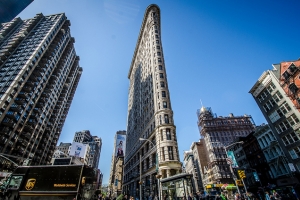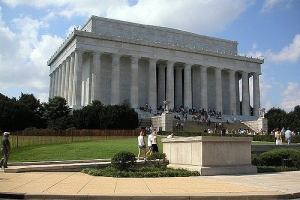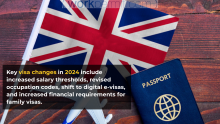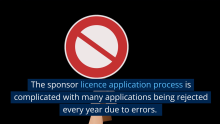Support migrant centric journalism today and donate

A report by an influential US think-tank says that refusal rates for L-1B visas have risen each year over the last decade and seem still to be rising. According to the National Foundation for American Policy, 9% of L-1B visa applications were refused in 2003. This had risen to 34% by 2013.
The report points out that, over this period there have been no changes to the regulations governing L-1B applications.
There has also been a large rise in the number of requests for evidence (requests for further information and documentation) made by immigration staff. 46% of applicants were asked for this in 2013; Only 16% were asked in 2003 and only 2% were asked in 2004. In 2008, the number of requests for further evidence rocketed from 17% to 49%.
'Specialized knowledge'
L-1 visas are intra company transfer visas allowing international firms to transfer an employee to work in the US. L1-A visas are for managers and last for up to seven years. L-1B visas are for skilled employees who possess 'specialized knowledge' of the business that is needed for the US office.Over recent years, it has been increasingly difficult for applicants to convince US immigration staff that their employees have specialized knowledge. In 2012, Oracle complained that one of their foreign employees was not issued with an L-1B visa because he was deemed not to have specialized knowledge of the product Oracle wanted him to work on.
This employee had, in fact, written the manual explaining how to use the software and therefore, presumably, knew it better than anyone else.
Lack of L-1Bs 'will harm business'
The NFAP report predicts that the increasing difficulty in acquiring L-1B visas will continue to cause problems for US businesses.Lynden Melmed, a former chief counsel at USCIS is reported to have said 'It is very difficult for companies to make business decisions when there is so much uncertainty in the L-1 visa Process. A company is going to be unwilling to invest in a manufacturing facility in the U.S. if it does not know whether it can bring its own employees into the country to ensure its success.
The report says that the increase in refusals is costing firms millions of pounds. It says that firms applying for L-1Bs are aware of the rules and pre-select employees that they believe will be eligible for visas because they do not want to waste money.
Rules interpreted more strictly
The report says that this rise in the number of refusals is therefore unlikely to be caused by a higher number of unsuitable candidates but instead by a change in the way that the rules are interpreted.Some firms report that immigration staff are refusing applications made on behalf of people unless they have 'extraordinary ability'. Some adjudicators ask whether the visa nominee has received a patent. Nothing in the regulations requires this level of ability.
The report states that it seems that the level of refusals is particularly high among Indian applicants. In 2008, only 2.8% of Indian applications were refused. By 2009, this had risen to 22.5%. USCIS has not released country specific figures for 2012 or 2013; anecdotal evidence suggests that this figure is much higher now.
US business made less competitive
The report concludes that 'the continuing high rate of denials and Requests for Evidence for L-1B petitions has a negative impact on the ability of companies to make products and services in the United States and compete globally'.The report asks whether USCIS 'adjudicators or their supervisors have been attempting to prevent the movement of people in the global economy'. It concludes 'If so, that should not be their role and the consequences for increasing jobs, investment and innovation on U.S. soil have not been good'.
If you would like to apply for a US visa, WorkPermit.com can help. WorkPermit.com is a specialist visa consultancy with 25 years of experience dealing with visa applications. We can help with a wide range of visa applications to your country of choice. Please feel free to contact us for further details.





















